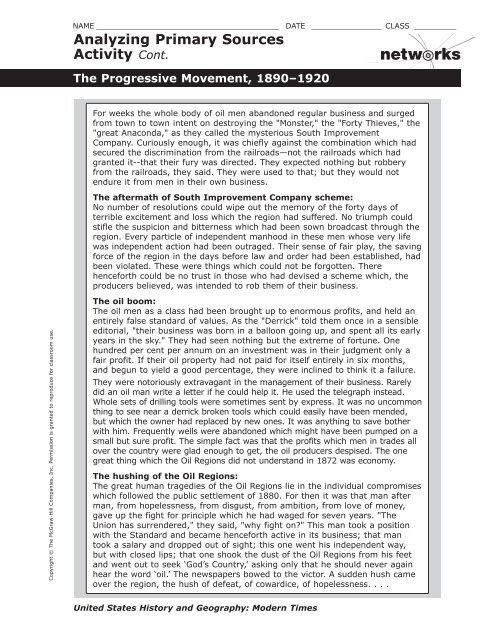netw rks
netw rks
netw rks
You also want an ePaper? Increase the reach of your titles
YUMPU automatically turns print PDFs into web optimized ePapers that Google loves.
NAME _______________________________________ DATE _______________ CLASS _________<br />
Analyzing Primary Sources<br />
Activity Cont.<br />
The Progressive Movement, 1890–1920<br />
<strong>netw</strong> <strong>rks</strong><br />
For weeks the whole body of oil men abandoned regular business and surged<br />
from town to town intent on destroying the "Monster," the "Forty Thieves," the<br />
"great Anaconda," as they called the mysterious South Improvement<br />
Company. Curiously enough, it was chiefly against the combination which had<br />
secured the discrimination from the railroads—not the railroads which had<br />
granted it--that their fury was directed. They expected nothing but robbery<br />
from the railroads, they said. They were used to that; but they would not<br />
endure it from men in their own business.<br />
The aftermath of South Improvement Company scheme:<br />
No number of resolutions could wipe out the memory of the forty days of<br />
terrible excitement and loss which the region had suffered. No triumph could<br />
stifle the suspicion and bitterness which had been sown broadcast through the<br />
region. Every particle of independent manhood in these men whose very life<br />
was independent action had been outraged. Their sense of fair play, the saving<br />
force of the region in the days before law and order had been established, had<br />
been violated. These were things which could not be forgotten. There<br />
henceforth could be no trust in those who had devised a scheme which, the<br />
producers believed, was intended to rob them of their business.<br />
Copyright © The McGraw-Hill Companies, Inc. Permission is granted to reproduce for classroom use.<br />
The oil boom:<br />
The oil men as a class had been brought up to enormous profits, and held an<br />
entirely false standard of values. As the "Derrick" told them once in a sensible<br />
editorial, "their business was born in a balloon going up, and spent all its early<br />
years in the sky." They had seen nothing but the extreme of fortune. One<br />
hundred per cent per annum on an investment was in their judgment only a<br />
fair profit. If their oil property had not paid for itself entirely in six months,<br />
and begun to yield a good percentage, they were inclined to think it a failure.<br />
They were notoriously extravagant in the management of their business. Rarely<br />
did an oil man write a letter if he could help it. He used the telegraph instead.<br />
Whole sets of drilling tools were sometimes sent by express. It was no uncommon<br />
thing to see near a derrick broken tools which could easily have been mended,<br />
but which the owner had replaced by new ones. It was anything to save bother<br />
with him. Frequently wells were abandoned which might have been pumped on a<br />
small but sure profit. The simple fact was that the profits which men in trades all<br />
over the country were glad enough to get, the oil producers despised. The one<br />
great thing which the Oil Regions did not understand in 1872 was economy.<br />
The hushing of the Oil Regions:<br />
The great human tragedies of the Oil Regions lie in the individual compromises<br />
which followed the public settlement of 1880. For then it was that man after<br />
man, from hopelessness, from disgust, from ambition, from love of money,<br />
gave up the fight for principle which he had waged for seven years. "The<br />
Union has surrendered," they said, "why fight on?" This man took a position<br />
with the Standard and became henceforth active in its business; that man<br />
took a salary and dropped out of sight; this one went his independent way,<br />
but with closed lips; that one shook the dust of the Oil Regions from his feet<br />
and went out to seek ‘God’s Country,’ asking only that he should never again<br />
hear the word ‘oil.’ The newspapers bowed to the victor. A sudden hush came<br />
over the region, the hush of defeat, of cowardice, of hopelessness. . . .<br />
United States History and Geography: Modern Times


